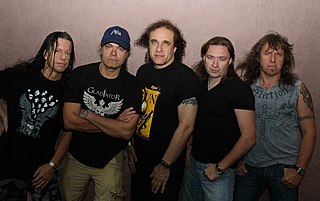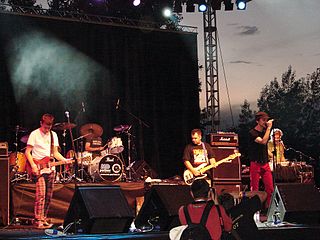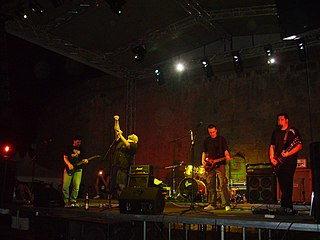
Richard Lester Meyers, better known by his stage name Richard Hell, is an American singer, songwriter, bass guitarist and writer.
The history of antisemitism, defined as hostile actions or discrimination against Jews as a religious or ethnic group, goes back many centuries, with antisemitism being called "the longest hatred". Jerome Chanes identifies six stages in the historical development of antisemitism:
- Pre-Christian anti-Judaism in Ancient Greece and Rome which was primarily ethnic in nature
- Christian antisemitism in antiquity and the Middle Ages which was religious in nature and has extended into modern times
- Muslim antisemitism which was—at least in its classical form—nuanced, in that Jews were a protected class
- Political, social and economic antisemitism during the Enlightenment and post-Enlightenment Europe which laid the groundwork for racial antisemitism
- Racial antisemitism that arose in the 19th century and culminated in Nazism
- Contemporary antisemitism which has been labeled by some as the new antisemitism

Grazhdanskaya Oborona, Russian for Civil Defense, or ГО, often referred to as ГрОб, Russian for coffin) were a Soviet and Russian rock band formed by Yegor Letov and Konstantin Ryabinov in Omsk, USSR, in 1984. They were one of the earliest Soviet and Russian psychedelic/punk rock bands. They influenced many Soviet and, subsequently, Russian bands. From the early 1990s, the band's music began to evolve in the direction of psychedelic rock and shoegaze, and band leader Yegor Letov's lyrics became more metaphysical than political.

Rock music became known in the Soviet Union in the 1960s and quickly broke free from its Western roots. According to many music critics, its "golden age" years were the 1980s, when the Soviet underground rock bands became able to release their records officially. Since then, Russia and Russophone artists in various other countries have developed a varied rock scene that covers virtually all rock genres, from classic and alternative rock to punk and heavy metal. The majority of the Russian bands perform in the Russian language.

Vladimir Mitrofanovich Purishkevich was a far-right politician in Imperial Russia, noted for his monarchist, ultra-nationalist, antisemitic and anticommunist views. Because of his restless behaviour, he was regarded as a loose cannon. At the end of 1916, he participated in the killing of Grigori Rasputin.

Aria is a Russian heavy metal band that was formed in 1985 in Moscow. Although it was not the first Soviet band to play heavy music, Aria was the first to break through to mainstream media and commercial success. According to several public polls, Aria ranks among top 10 most popular Russian rock bands. Their sound resembled that of NWOBHM bands, for which they were dubbed the "Russian Iron Maiden" in the media.

Obojeni Program is a Serbian alternative rock band from Novi Sad. The band are pioneers of the Serbian alternative rock scene. The first letters of the band's first seven studio albums form an acronym of their home town. They have performed at every Exit festival since the first in 2000, with the exception of the virtual Exit held in September 2020.
Die anderen Bands is a term combining alternative music bands of 1980s GDR. They shared a more or less open criticism of their country's political system, and a high degree of creativity which was lacking from the more established music scene of East Germany. Many members of these bands played significant parts during the time of political change Wende in 1989. The bands came from a broad range of musical genres, especially Punk, Blues, Wave, Indie and Electronic music.
The accusation that Joseph Stalin was antisemitic is much discussed by historians. Although part of a movement that included Jews and rejected antisemitism, he privately displayed a contemptuous attitude toward Jews on various occasions that were witnessed by his contemporaries, and are documented by historical sources. In 1939, he reversed Communist policy and began a cooperation with Nazi Germany that included the removal of high profile Jews from the Kremlin. As dictator of the Soviet Union, he promoted repressive policies that conspicuously impacted Jews shortly after World War II, especially during the anti-cosmopolitan campaign. At the time of his death, Stalin was planning an even larger campaign against Jews. According to his successor Nikita Khrushchev and others, he was fomenting the doctors' plot as a pretext for further anti-Jewish repressions.

"Chinese Democracy" is a song by the American rock band Guns N' Roses, and the title track from their sixth studio album. It was released as a radio single on October 22, 2008 and was released on the iTunes Store on November 9, 2008. It was primarily written by Axl Rose and Josh Freese. It was the band's first single of original material since "Estranged" was released in 1994 as the final single off the 1991 album Use Your Illusion II.

Bi-2 is a Belarusian alternative rock band, formed in the 1980s in Bobruisk, Belarus. It was one of the most successful with many sales and chart-hits in Russia. Bi-2 was awarded MTV Russian Music Awards for Best Rock Act in 2007.

Bjesovi are a Serbian alternative rock band from Gornji Milanovac.
Antisemitism —prejudice, hatred of, or discrimination against Jews— has experienced a long history of expression since the days of ancient civilizations, with most of it having originated in the Christian and pre-Christian civilizations of Europe.

The Leningrad Rock Club was a historic music venue of the 1980s in Leningrad, situated on Rubinstein Street in the city centre. Opened in 1981 and overseen by the KGB, it became the first legal rock music venue in Leningrad. Overall, it was the largest rock scene in the Soviet Union and influenced the development of Russian rock.
The 1917 Russian Revolution overthrew a centuries-old regime of official antisemitism in the Russian Empire, dismantling its Pale of Settlement. However, the previous legacy of antisemitism was continued by the Soviet state, especially under Joseph Stalin. After 1948, antisemitism reached new heights in the Soviet Union, especially during the anti-cosmopolitan campaign, in which numerous Yiddish-writing poets, writers, painters and sculptors were arrested or killed. This campaign culminated in the so-called Doctors' plot, in which a group of doctors were subjected to a show trial for supposedly having plotted to assassinate Stalin.
Riot grrrl is an underground feminist punk movement that began during the early 1990s within the United States in Olympia, Washington and the greater Pacific Northwest and has expanded to at least 26 other countries. Riot grrrl is a subcultural movement that combines feminism, punk music, and politics. It is often associated with third-wave feminism, which is sometimes seen as having grown out of the riot grrrl movement and has recently been seen in fourth-wave feminist punk music that rose in the 2010s. The genre has also been described as coming out of indie rock, with the punk scene serving as an inspiration for a movement in which women could express themselves the same way men have been doing all along.

Instruktsiya po vyzhivaniyu is the 17th album by the Russian punk band Grazhdanskaya Oborona, released in 1990. It was their final album before their break up a week later, but they reformed in 1993.

The Jewish left consists of Jews who identify with, or support, left-wing or left-liberal causes, consciously as Jews, either as individuals or through organizations. There is no one organization or movement which constitutes the Jewish left, however. Jews have been major forces in the history of the labor movement, the settlement house movement, the women's rights movement, anti-racist and anti-colonialist work, and anti-fascist and anti-capitalist organizations of many forms in Europe, the United States, Australia, Algeria, Iraq, Ethiopia, South Africa, and modern-day Israel. Jews have a history of involvement in anarchism, socialism, Marxism, and Western liberalism. Although the expression "on the left" covers a range of politics, many well-known figures "on the left" have been of Jews who were born into Jewish families and have various degrees of connection to Jewish communities, Jewish culture, Jewish tradition, or the Jewish religion in its many variants.

Bajtek is one of the first popular magazines devoted to computer science in Poland. Its title was an reference to the computer term byte and to the American magazine Byte. The founder was Waldemar Siwiński. The magazine was very well-known in the late 1980s in the country. It was published between 1985 and 1996. The magazine was inspired by the British magazine Your Computer and the American magazine Compute!. The sponsor of Bajtek was Polish Socialist Youth Union which is also known is ZSMP.













